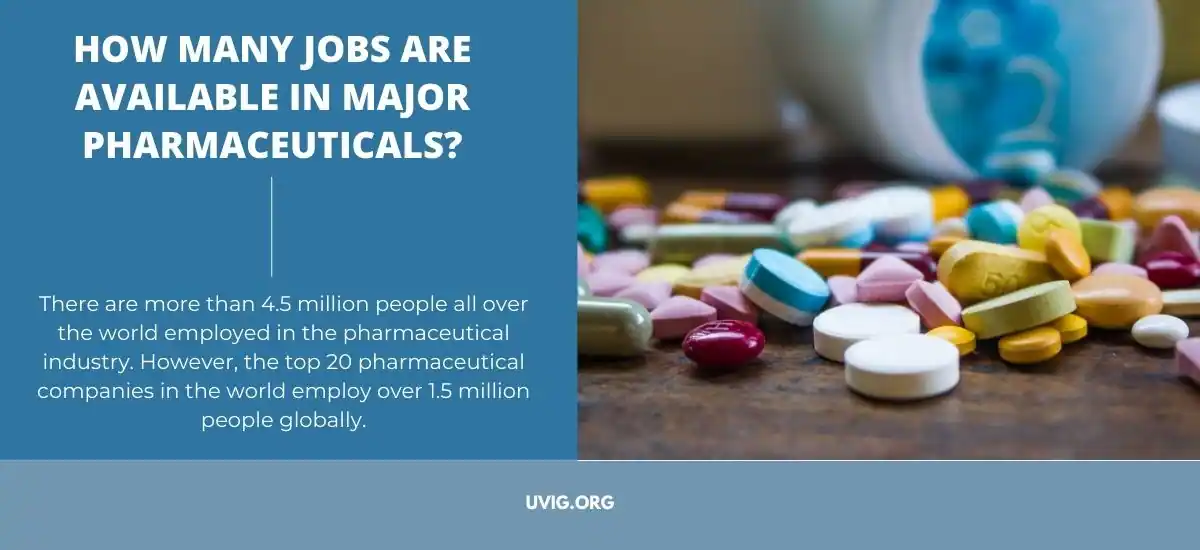There are more than 4.5 million people all over the world employed in the pharmaceutical industry. In addition to this, there are 5 career options available in the pharmaceutical industry depending on the students and their educational qualifications.
Jobs in the pharmaceutical industry are considered to be one of the highest-paying jobs in the industries. The pharmaceutical industry is in charge of developing modern medicine by creating medicines for society and conducting medical research.
Before you understand how many jobs are available in major Pharmaceuticals Industries, it is best to understand the role and objectives of the industry towards society. They have several well-paying job openings, some of which require no education or prior work experience.
Pharmacists in the industry have relatively high job security worldwide. As the medical industry expands, there will always be a high demand for well-trained professional pharmacists. After earning a degree or diploma in pharmacy, self-employment is another viable career option.
How Many Jobs Are Available In Major Pharmaceuticals?
The job in a major pharmaceuticals career offers the right outlook for pharmaceuticals careers. It is just great and outstanding. There are over 5-6 roles in this industry has over 5 million people working every day to earn their bread and butter.
The major pharmaceutical industry is full of big ideas, big money, and big career opportunities. Pharma employees and employers alike make a difference in the lives of millions of Americans, increasing the appeal of major pharmaceuticals as a good career path.

The pharmaceutical sector, an important economic and societal presence develops, manufactures, and sells a virtual medicine cabinet stocked with prescription and over-the-counter drugs.
These medications cure, treat and prevent a wide range of conditions, including cancer, high cholesterol, and colds, as well as diabetes, Alzheimer’s disease, and allergies.
According to a report of a survey, the average annual salary in pharmaceutical and medicine manufacturing in 2023 will be $74,560. That is significantly higher than the national average of $60,290 for all occupations.
However, because there are so many different positions in the industry, the pay varies greatly. Pharmacy technicians, for example, earned an average annual salary of $35,250 in May 2022, while compliance officers earned $85,520.
Disruptive technologies and emerging trends such as robotics, artificial intelligence, 3D printing, precision medicine, and patient design will have an impact on pharmaceutical manufacturing and distribution.
What Are The Highest Paying Jobs In Major Pharmaceutical Industry
Many jobs in major pharmaceutical companies pay more than $100,000 per year. According to the American Association of Pharmaceutical Scientists, the average base salary for a pharmaceutical scientist is $180,000 per year.
A Pharma Company can earn the highest salary of 5.9 Lakhs per year (49.2k per month). With total compensation exceeding $208,000. In addition, pharmacists earn an average of $125,690 per year, with the top 10% earning more than $165,590.
They mainly work at research institutes or government organizations to monitor new diseases, assess the efficacy of new medications, and study genetics. You can learn the analytical and mathematical abilities necessary for success as a biostatistician.
Successful biotech consultants are familiar enough with therapies, medical technology, and product development to offer reliable guidance for boosting earnings.
The pharmaceutical industry provides numerous career paths, ranging from R&D to sales and marketing, manufacturing, and science. The following are some of the most common major pharmaceutical roles
You may also like: How To Make Wood In Little Alchemy 2 ?
list of jobs in the pharmaceutical industry
- Scientist
- Chemist
- Pharmacist
- Representative of sales
- Manager of clinical research
- Project supervisor
- Manufacturing supervisor
- Manager of Quality
- Manager of a laboratory
- Contract supervisor
- Director of Supply Chain
- Officer of Regulatory Affairs
- Patent lawyer
- Financial expert
- Analyst in pharmacoeconomics
- Sales professionals
- Marketing specialists
- Data analysts
- Researchers
Many entry-level pharma jobs are junior versions of higher-level positions. They are as follows:
- Sales representative, junior
- Junior account executive
- Associate in R&D
- Assistant chemist
- Assistant in the laboratory
- Technician in a pharmacy
- Associate Professor
- Associate in the supply chain
- Financial analyst (Junior)
Let’s check the best paying jobs in major pharmaceuticals-
Medical Science Liaison
Salary: $55,340 per year
Role: A practitioner who informs consumers, investors, and governmental organizations about medical equipment, substance, or treatment is known as a medical science liaison.
To learn how to cure medical diseases, researchers run studies and analyze data from medical samples.
Pharmaceutical Financial Analyst
Salary: $71,022 per year
Role: When advising corporate leaders on how to manage their finances, they can take into account marketing trends, the organization’s current financial soundness, and the surrounding economic, industrial, and commercial contexts.
Regulatory Specialist
Salary: $76,150 per year
Role: A regulatory specialist is a specialist who helps biotechnology or pharmaceutical businesses get their goods approved.
They can confer with government officials on how to make drugs or devices compliant and advise scientists on how to meet current regulations while developing medicines. They help in ensuring that all products are properly labeled throughout production.
Pharmaceutical Finance Analyst
Salary: $85,626 per year
Role: Outside sales representatives, a pharmaceutical finance analyst works differently. The travel is frequent and is now meant to meet the vendors with other professionals with the best knowledge on medicines and other methods of composition.
Biotechnology Consultant
Salary: $140,073 per year
Role: Consultants in biotechnology are professionals with backgrounds in both biology and technology. They give management at biotechnology companies direction and counsel on how to create better drugs and medical devices.
To advise decision-makers on what new initiatives they should launch, a biotechnology consultant may identify problems that require treatment or current trends in the sector.
Pharmacy Sales Manager
Salary:$118,900 per year
Role: For the pharmacy they oversee, a pharmacy manager offers direction and structure. They plan medication deliveries, consult with patients, and train techs and pharmacists.
A pharmacy manager could be employed by a hospital, grocery store, corner shop, local or chain pharmacy, or disbursement center.
Pharmacy managers can increase their self-assurance and understanding of drugs and their interactions in order to succeed.
Research Scientist Head
Salary: $88,976 per year
Role: Scientists that conduct pharmaceutical research carry out studies to improve, find, or develop new medications. The pharmacological reactions and potential adverse effects of any new medicine are investigated using synthetic and natural materials.
Clinical trials may be planned and carried out by a research scientist in pharmaceuticals. Research scientists need to be meticulous and have an in-depth understanding of biology and chemistry to succeed in this position.
Biostatistician
Salary: $115,100 per year
Role: A biostatistician carries out research and gathers information on public health. They can analyze the data they gather to make projections about the course of biological events.
Professionals in the medical field, such as doctors, surgeons, and geneticists, can work along with biostatisticians.
Qualifications Required To Get A Job In Major Pharmaceuticals
When the educational requirements for major pharmaceuticals come under the spotlight, there are multiple things that are notified.
The major pharmaceuticals is a knowledge-driven industry that requires a highly skilled workforce, higher-level jobs may require an undergraduate degree, with some requiring advanced degrees.
The basic qualification consists of a two-year Diploma in Pharmacy (D. Pharma) followed by hospital training. Students can also pursue a four-year Bachelor of Pharmacy (B. Pharma) degree.

Skills Required for a Job in the Pharmaceutical Industry-
- Project Management Capabilities
- Specializations
- Transferable abilities
- Strategic Thinking and Problem Solving Creativity
- Management Capabilities
- Understanding of Industry Trends
- Knowledge of Regulations and Legal Issues
- Teamwork and Conflict Resolution
If you work in the pharmaceutical industry or want to, learning about which roles pay the most can be beneficial. The pharmaceutical industry develops and manufactures the medications we rely on to stay healthy. Because medicine and research are critical to medical advancement, there are numerous high-paying jobs available in the industry.
Working in these domains requires knowledge. You cannot work here if you have not completed your studies. As a result, you need to study and obtain some excellent credentials. You can apply for the position if you have a bachelor’s degree.
However, your chances of landing the position improve if you have a doctorate and a master’s degree. All of these degrees call for a two-year or longer internship.
So make sure you complete your internship with a reputable organization. They do this to make your resume look appealing and to include the names of some big companies. To work here, try to strengthen your communication abilities. The rudimentary lingo is required for you to function here. So make sure you do your homework.
An Overview Of Pros And Cons Of Pharmaceutical Careers
While considering the level of jobs available in the major pharmaceuticals, one must consider the pros as well as the cons of the pharmaceutical industry.

One has to make sure that they have the right educational qualification as well as the right opportunities for a career. The pharmaceutical industry is considered to be one of the world’s biggest and most diversified industries with the provision of employment opportunities.
Pros:
- Major pharmaceutical companies have multiple varieties of opportunities for any kind of further career advancement.
- Talented people are identified as one of the potential pillars of any industry. And, those working in the pharmaceutical world of jobs come up with fantastic growth potential and productivity.
- The demand for pharma companies is high. The medications and the study of the composition of medicines are high in demand.
- Pharmaceutical industry employees usually have the chance to earn highly sought-after and financially rewarding wages, in addition to benefits like stock options and bonuses.
- Even if you want to specialize in pharmaceutical production, there are some opportunities in the pharmaceutical business where you can start working right away without needing a Ph.D.
- Only a high school diploma or GED is apparently required for about 57% of pharmaceutical and medicine manufacturing positions, while just over 4% require no formal education at all.
Cons:
- Jobs in the pharmaceutical industry can be unpredictable and are known for their abrupt layoffs.
- A career in this field may be riskier than one in other industries.
- Although a graduate degree is not often required for jobs in the pharmaceutical industry, the highest-paying ones sometimes are.
- Higher-level roles may require an undergrad course, with some requiring an advanced degree.
- The major pharmaceutical business is knowledge-driven and demands highly qualified personnel.
- Some of the job roles in the world of pharmaceutical manufacturing sectors may become obsolete owing to the growth of technology and the replacement of robots.
- Leading pharmaceutical businesses provide opportunities at the highest levels. However, you must have the required knowledge and capabilities.
- The number of open positions, the educational requirements, the remuneration, and the application procedure are all included.
Frequently Asked Question
Q1. Are Pharmaceutical Jobs In Demand?
Ans1. Yes, jobs in the pharmaceutical industry are high in demand. And the salaries are also high compared to the other sectors. This makes them one of the top preferred white-collar jobs in the world of employment.
There are limitless career opportunities that an individual can prefer taking if he or she is willing to find a career in pharmaceutical science. Developing new medicines and improving their compositions is one of the most highly delivered tasks.
Q2. Is the pharma industry a good career?
Ans2. Yes, the pharma industry is a good career option. In this industry, pharmacists all across the globe have a pretty high degree of job stability. According to the increasing proportion, there will always be massive demand for well-trained, certified, and experienced professionals.
And, talking the average salaries in monthly salary range, it approximately ranges from $10,754 per month and the number may go high depending on the number of hours and the service he or she is giving to the business.
Q3. How many jobs are available in other pharmaceuticals?
Ans3. It’s difficult to provide an exact number of jobs available in other pharmaceutical companies as it varies greatly depending on the size and scope of the company. However, the pharmaceutical industry as a whole employs millions of people worldwide in various roles and departments.

